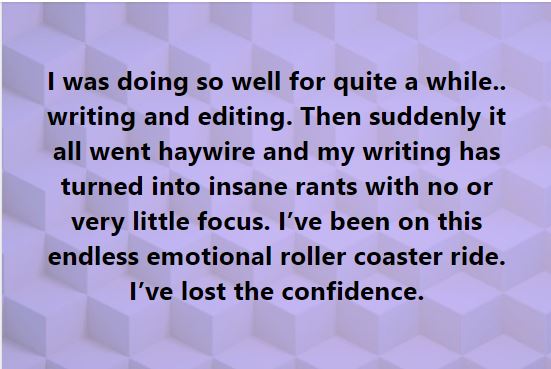When I see a post like this, I try to help. This is my area of expertise, afterall.

So, first, I’m certain, this person’s experience is not unique. “Then suddenly it went haywire…” could describe most of our writing days, at some point. And second, just for the record, I asked permission to quote her post here.
How can I help this person? How can you help yourself when you’re having a writing day like this?
Three problems that I see:
- Very Little Focus
- Lost Confidence
- Self-judgement
It’s important to take them one at a time, so you’re not just bogged down in panicked thoughts.
Focus in Your Writing
Sometimes it is fun to write without purpose or goalpost, and very good work can result from stream of consiousness, pushing your pen, unfocused writing. My friend’s “insane rants” as she calls them, could well be coming out of her pen, indeed, to get her attention and cause her to notice something in her life or in her writing.
But when you want – or need – to focus your writing, use a clarifying tool.
5 whys
Ask yourself why you are writing this piece? Does an answer come? Ask again, why? Write down your answers, and keep asking why – at least 5 times. Little by little you will see more clearly why you are writing at all, why you are writing this piece and what you are trying to accomplish/what story you intend to tell. This tool was taught to me by Martha Beck, PhD., and can be found in her book, Finding Your Own North Star
Regain Confidence
Confidence is very much a “felt” experience, not always anchored in any reality outside the writer’s own mind. You might have excellent reasons to be confident – you’re published, you have an MFA, you have awards – and still not feel it on any given day. And you can have zero rationale for felt confidence, and still enjoy its presence and strength in what you write.
Eric Maisel, PhD was one of my teachers and mentors, and it is impossible for me to believe I have not blogged his “CENTER” tool before. It is awesome. Recenter on your work, with some amazing mantras and self-talk.
- Come to a complete stop.
- Empty yourself of expectation
- Name your work
- Trust your resources
- Embrace the Present Moment
- Return with Strength
These steps are spoken to yourself on the inhale and exhale of your breath. You can do this even as you sit at your desk. It can be an intervention between when you push back, and before you stand up and leave your work. In the case of someone who has lost confidence, it is a centering way to reapproach your work.
Here’s how the steps become a centering mantra. I use parantheses to seperate the sentences into their inhale and exhale parts of your breath.
- (I am completely) (stopping)
- (I expect) (Nothing)
- (I am writing) (…)
- (I trust) (my resources)
- (I embrace) (this moment)
- (I return) (with strength)
This is transcribed very much as Dr. Maisel intended. For my own part, I tend to use #3, 5 and 6 and it brings me back, refreshed and ready. The simple assertion of what I am actually doing – I am writing my novel – brings me out of wandering and judgemental thoughts. This appears in Maisel’s book Coaching the Artist Within.
Quit Judging Yourself
Judgey voices live in our heads and usually we think, “wow, she makes a good point, this is an insane rant with no or very little focus!” You think any reasonable person would agree. So, you agree.
And then you feel it. As soon as you believe the judgey thought, your whole body slumps. You are no longer writing. You are thinking about the judgey thought. Is it true? So, stop and ask, is it? If it is – change something. But if you can’t be absolutely sure it’s true, then considering ditching the thought.
Go ahead – ditch the thought. How do you feel? How do you behave? Better, right? Until that naggy, judgey thought comes back. So, since we don’t know that it’s true, let’s turn it around and make an opposite statement that might just as true.
“I shouldn’t be writing insane rants” could become “I should be writing insane rants” or “I am writing insane rants, and therefore there might be some logical reason for it. Some focus I might gain from it.”
How does the new thought feel? Is the new thought true? Think of (and write down) three proofs of the new thought. When the old thought comes roaring back, push back with your new truer thought, and sustain your ease and confidence. This thought turnaround is the life’s work of Byron Katie and is detailed in her book, Loving What Is.
For more tools, shared turbulence and trusted space, come to the Write Without the Fight FB group